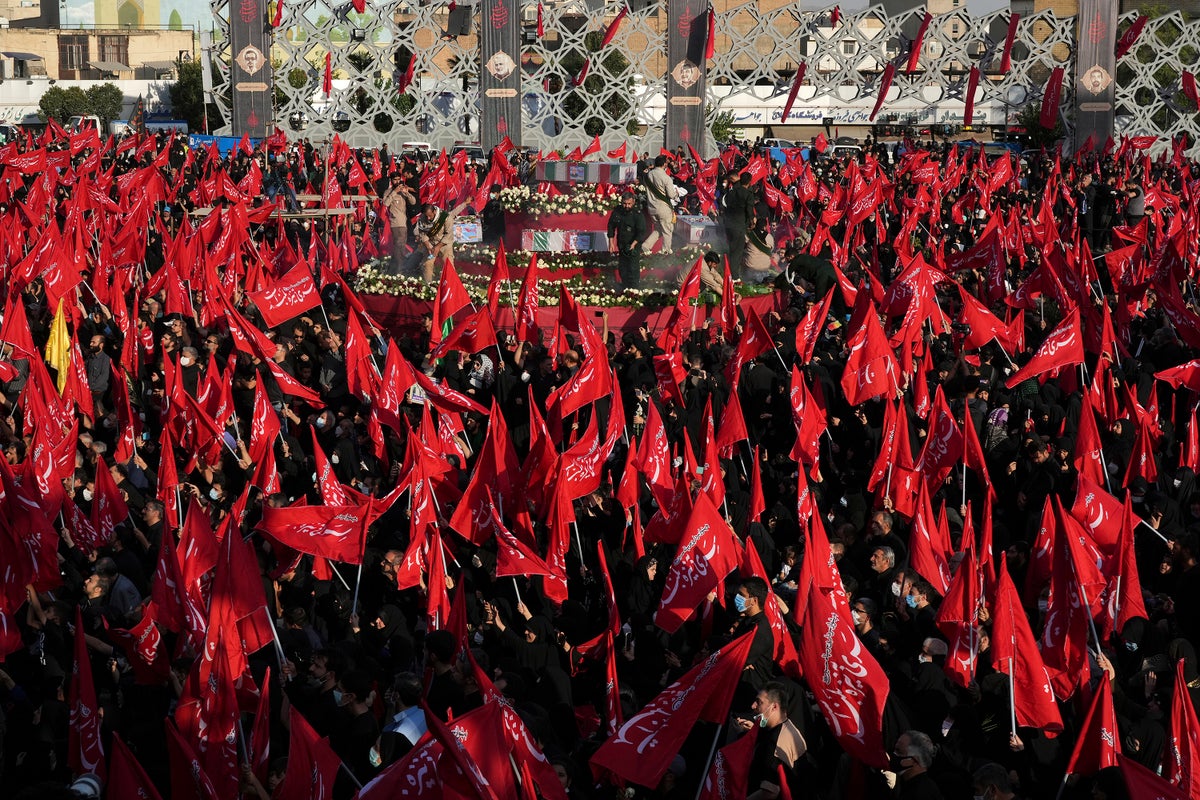
Mourners poured out onto the streets of Tehran on Thursday to pay their respects to several Iranian officers killed in Syria, a testament to the human cost of Iran’s involvement in the civil war and a public display of nationalist fervor as nuclear talks resume in Vienna.
The remains of the paramilitary Revolutionary Guard members were recently recovered in Khan Tuman, a village 9 miles (about 15 kilometers) south of Aleppo, Syria’s largest city that was for years the war’s most important front line.
The Guard identified the five deceased fighters, providing few details about their deaths with the exception of Gen. Abdollah Eskandari — a decorated commander who became known as the “headless general” after his capture and beheading by Syrian rebels in May 2014. Their bodies were repatriated after a lengthy process of recovery and DNA analysis.
Iran has increasingly admitted casualties since it intervened to rescue Syrian President Bashar Assad's government, a ground presence that coincided with Russia’s air campaign and helped Assad recover control over most of the country. Although Iran has only acknowledged its forces as having an advisory role, dozens of Iranian soldiers have been killed fighting the Islamic State group and other extremists in Syria.
Funeral marches snaked through cities across the country this week, beginning Monday in the northeastern city of Mashhad before moving south, returning each officer's body to his birthplace for burial.
The thousands that gathered in Tehran’s streets on Thursday evening waved red flags to mark Ashoura, a commemoration of the 7th century death of Prophet Muhammad’s grandson Hussein, a revered figure in Shiite Islam. Chants of “Death to America” and “Death to Israel” rang out from the crowds.
In a speech, Guard commander Gen. Hossein Salami hailed the return of the fighters’ remains and the survival of Assad’s government.
“We wanted the (Assad’s) system to remain but the U.S., Europe and the Arab world did not want it. Now see who remains in the country,” Salami declared.
Meanwhile, Iran's Intelligence Ministry said authorities arrested 10 suspects with links to the Islamic State group who had planned attacks at various locations across Iran during Ashoura rallies planned next week. Two agents were wounded in shootouts with suspected militants in the country's south and west, the ministry added.
Iran’s Shiites revere the dead, especially their martyrs killed in battle, so the funerals for the Guard officers present a way to gauge public opinion and rally support for the theocracy at a time of political and economic crisis.
Talks to revive Iran’s tattered 2015 nuclear deal with world powers resumed Thursday in Vienna after a monthslong deadlock, apparently a last-ditch effort to save the diplomatic process from collapse. Prospects for a breakthrough have darkened as Iran rapidly advances its nuclear work under diminishing international oversight and political opposition to the deal rises in Washington.
Meanwhile, Iran’s economy is staggering under heavy sanctions four years after former President Donald Trump withdrew the United States from the landmark accord, which granted Tehran sanctions relief in exchange for strict curbs on its atomic program.
As inflation surges to new heights and desperation grows over deteriorating living conditions, Iranian hard-liners have sought to reinforce the national ideology. Earlier this spring, authorities organized performances for a new pop song called “Hello Commander!” and school children across the country saluted Supreme Leader Ayatollah Ali Khamenei.







